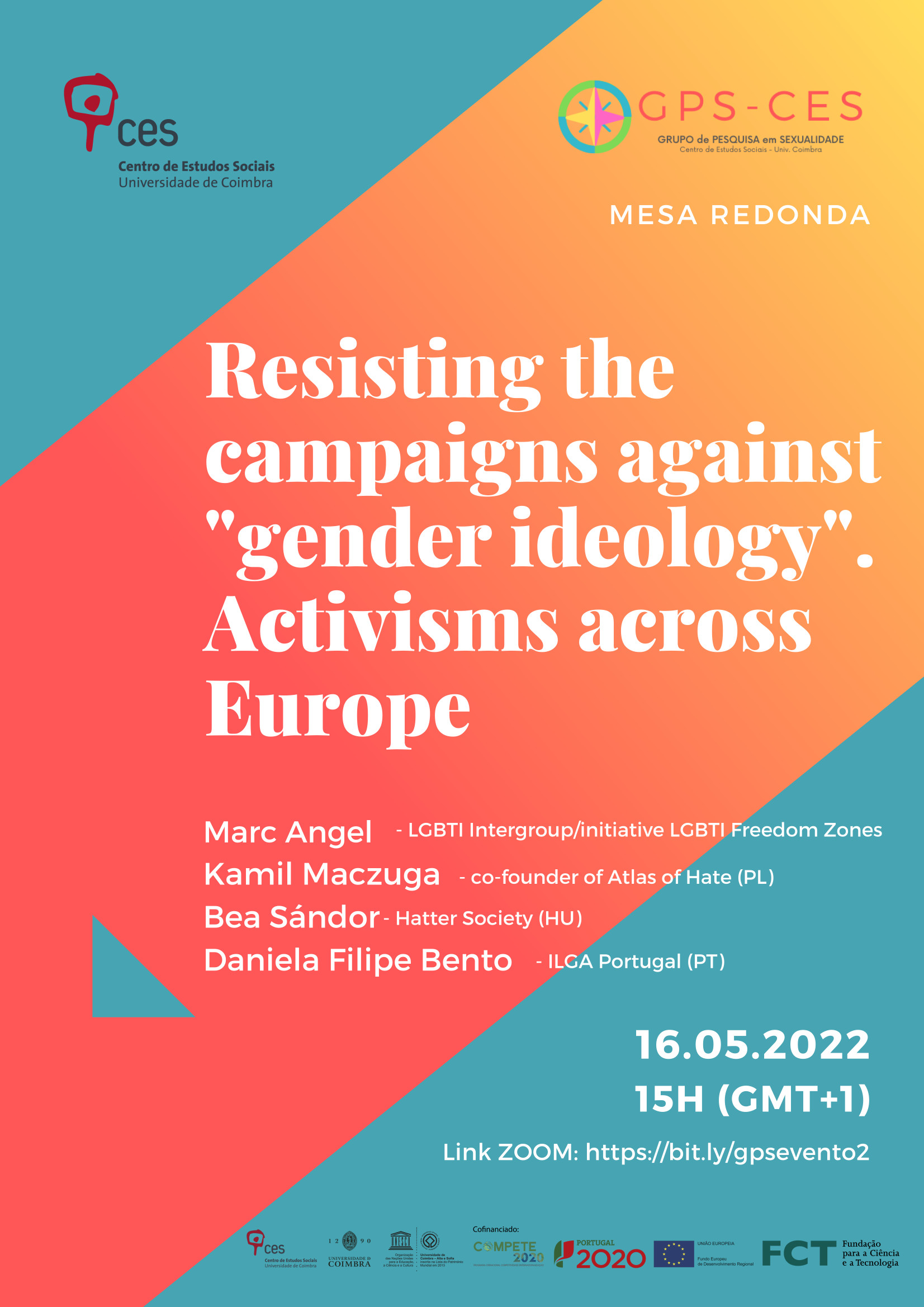Mesa-Redonda | GPS-CES
Resisting the campaigns against "gender ideology". Activisms across Europe
Bea Sándor
Daniela Filipe Bento
Kamil Maczuga
Marc Angel
16 de maio de 2022, 15h00 (GMT+1)
Evento em formato digital
Apresentação
During the last years, discourses and campaigns against “gender ideology” - a concept adopted to articulate opposition to gender equality, abortion, sexual education, and LGBTQIA+ rights in areas such as marriage, adoption, surrogacy, and reproductive technologies - have gained public visibility within European countries’ politics and mediascapes, raising concerns about the efficacy of EU legislation in the protection of LGBTQIA+ people. The mobilisations against “gender ideology” have been concomitant with systematic attacks on LGBTQIA+ people’s rights, increasing their vulnerability to violence and leading to concrete obstacles related to changes in countries' legislation and policies on the protection of LGBTQIA+ people. The Hungarian law banning queer content in educational settings and the media and its government’s attacks on sexual education promotes disinformation and increments the invisibility of queer lives. In Poland, several municipalities have officially declared themselves unwelcoming to an alleged “gender ideology” and free of queer people. Through the rejection of the so-called “gender ideology” in the European Union, those examples are amongst the most emblematic ongoing attempts to stigmatize sexual minorities and establish discrimination and social inequality.
The UE has since clarified its position on the matter, with a resolution declaring the European Union an "LGBTIQ freedom zone”; and has taken legal actions against Hungary and Poland, pointing to Article 21 of the EU Charter of Fundamental Rights and Article 19 of the Treaty on the Functioning of the European Union. Queer people have also been developing a broad array of initiatives to resist anti-gender campaigns and policies within the EU, thought organizations, movements, and grassroots collectives.
In this roundtable, the Group of Research in Sexualities (CES-GPS) brought together actors in the area - European policymakers and grassroots activists - to debate the panorama of anti-gender discourses and policies in the European Union, and to shed light on ongoing resistance strategies and initiatives mobilised at various levels, from the European Union to grassroots collectives in Portugal, Poland, and Hungary.
Notas biográficas
Marc Angel (LGBTI Intergroup/initiative LGBTI Freedom Zones) | Member of the European Parliament since December 2019. He became Co-President of the LGBTI Intergroup in January 2020. Marc has over 25 years of HIV/AIDS advocacy and was appointed UNAIDS Champion for the 90-90-90 targets. He is a member of the Committees on Employment and Social Affairs and Petitions. In addition, he is a substitute in the Committees on Economic and Monetary Affairs, Internal Market and Consumer Protection and the Special Committee on Beating Cancer. In addition, Marc is a member of the Delegation to the Euro-Latin American Parliamentary Assembly and the Delegation to the EU-Chile Joint Parliamentary Committee. He is substitute in the Delegation for relations with the People’s Republic of China.
Kamil Maczuga | LGBT activist from Cracow in Poland. Nominated for the Sakharov Prize as a co-founder of Atlas of Hate. Member of the Equal Signs Federation. Currently advocating for anti-SLAPP regulations.
Bea Sándor (Hatter Society - HU) | Graduated in 2014 at the Department of Law of ELTE, Budapest, where she had studied since 2009. Earlier she had worked as a literary scholar and translator, and holds a PhD in English literature and an MA in Gender Studies (CEU, 1999). She has been working in NGOs since 1997: e.g. she used to be a volunteer and then an executive board member of Hatter. In 2000 and 2002 she was an International Policy Fellow at the Open Society Institution, and participated in an international human rights training at Columbia University, New York (Center for the Study of Human Rights, 2001). She worked as an equal opportunities expert in the field of LGBT rights for the Ministry of Social Affairs and Labor in 2010, and participated in the work of the DH-LGBT of the Council of Europe drafting a recommendation on measures to combat discrimination on grounds of sexual orientation or gender identity. She has been working as a project coordinator and legal expert for Háttér Society's Legal Program since February 2015.
Daniela Filipe Bento (Dani Bento) | 35 years old, born in Cartaxo, but living in Lisbon, is a LGBTIQ+, law, social justice and mental health activist. With a degree in Astrophysics and being a Software Engineer as a profession, she is part of the current board of Associação ILGA Portugal as well as coordinator of the Trans Reflection and Intervention Group (GRIT) of the same association. She is part of the Trans Health Network and the Working Group for the implementation of ICD-11, two initiatives of Transgender Europe (TGEU).
___________________
Esta atividade realiza-se através da plataforma Zoom, sem inscrição obrigatória. No entanto, está limitada ao número de vagas disponíveis > https://us02web.zoom.us/j/87080252204?pwd=dFZCQ000MmNPM1YwUnljelQvdnNyUT09 | ID: 870 8025 2204 | Senha: 159458
Agradecemos que todas/os as/os participantes mantenham o microfone silenciado até ao momento do debate. A/O anfitriã/ão da sessão reserva-se o direito de expulsão da/o participante que não respeite as normas da sala.
As atividades abertas dinamizadas em formato digital, como esta, não conferem declaração de participação uma vez que tal documento apenas será facultado em eventos que prevejam registo prévio e acesso controlado.


